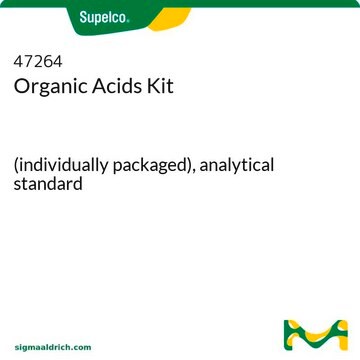913243
Maleic acid
≥99.5% (HPLC), <=0.5% water
Synonim(y):
(2Z)-2-Butenedioic acid, (2Z)-But-2-enedioic acid, Maleinic acid, cis-Butenedioic acid, Toxilic acid
About This Item
Polecane produkty
Poziom jakości
opis
Residue on Ignition: <= 0.1%
Próba
≥99.5% (HPLC)
≥99.5% anhydrous basis (HPLC)
Postać
powder
kolor
white to off-white
mp
130-135 °C (lit.)
137-140 °C (lit)
gęstość
1.59 g/mL at 20 °C (lit.)
1.59 g/mL at 25 °C (lit.)
ciąg SMILES
OC(=O)\C=C/C(O)=O
InChI
1S/C4H4O4/c5-3(6)1-2-4(7)8/h1-2H,(H,5,6)(H,7,8)/b2-1-
Klucz InChI
VZCYOOQTPOCHFL-UPHRSURJSA-N
Szukasz podobnych produktów? Odwiedź Przewodnik dotyczący porównywania produktów
Opis ogólny
Zastosowanie
Maleic acid has been used in constructing polymeric solid electrolytes for battery and fuel cell research. Maleic acid based polymer blend were reported to increase the ionic conductivity of PEO basd polymer solid electrolytes by suppressing crystallization.
Maleic acid has also been used to make superswelling acrylamide (AAm)/maleic acid (MA) hydrogels by free radical polymerization in aqueous solution of AAm with MA as comonomer with some multifunctional crosslinkers such as trimethylolpropane triacrylate and 1,4-butanediol dimethacrylate. In this hydrogel system, the uptake of cationic dye increased with an increase of MA content in the AAm/MA hydrogels.
Hasło ostrzegawcze
Danger
Zwroty wskazujące rodzaj zagrożenia
Zwroty wskazujące środki ostrożności
Klasyfikacja zagrożeń
Acute Tox. 4 Dermal - Acute Tox. 4 Oral - Eye Dam. 1 - Skin Corr. 1 - Skin Sens. 1 - STOT SE 3
Organy docelowe
Respiratory system
Kod klasy składowania
8A - Combustible corrosive hazardous materials
Klasa zagrożenia wodnego (WGK)
WGK 1
Certyfikaty analizy (CoA)
Poszukaj Certyfikaty analizy (CoA), wpisując numer partii/serii produktów. Numery serii i partii można znaleźć na etykiecie produktu po słowach „seria” lub „partia”.
Masz już ten produkt?
Dokumenty związane z niedawno zakupionymi produktami zostały zamieszczone w Bibliotece dokumentów.
Nasz zespół naukowców ma doświadczenie we wszystkich obszarach badań, w tym w naukach przyrodniczych, materiałoznawstwie, syntezie chemicznej, chromatografii, analityce i wielu innych dziedzinach.
Skontaktuj się z zespołem ds. pomocy technicznej




